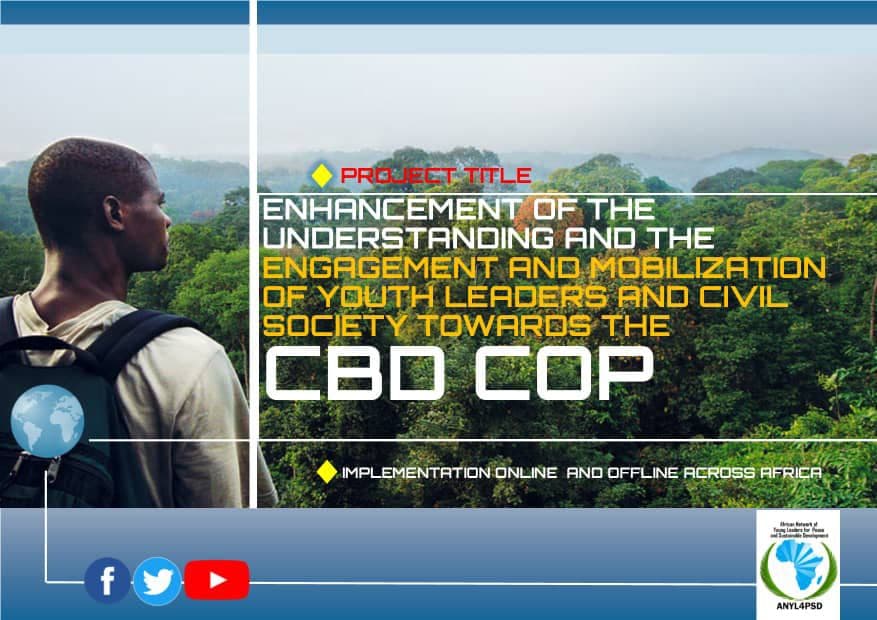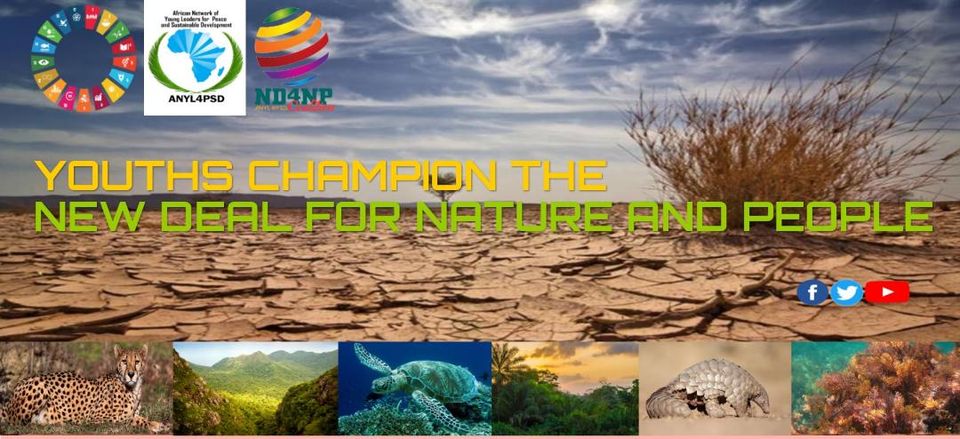Enhancement of the understanding and the engagement and mobilization of Youth Leaders and civil society towards the CBD COP
The 2010- 2020 Strategic Plan of the Convention on Biological Diversity sets 20 global biodiversity targets or Aichi Targets to be attained in the efforts to reduce biodiversity loss and ensure its contribution to human wellbeing in the move towards the global 2050 vision to live in harmony with nature. African Countries in compliance with their commitment to this global undertaking, alongside several member states worldwide, internalized the Strategic plan through the adoption of national biodiversity strategic frameworks that defined priorities and provided orientation for interventions. Several national Biodiversity Strategies and Action Plans adopted in Africa within this dynamic equally demands an early reflection towards the identification of adapted national biodiversity priorities beyond 2020 and the extent to which this reflection can influence and contribute to the process of developing a post-2020 global biodiversity framework. The COP 14 decision has therefore set-in motion the process for a new global framework for biodiversity to be adopted during the 15th Conference of Parties (COP 15) of the CBD, to be held in 2020 in Italy.
The comprehensive consultative approach defined for this process includes the following: global inter-sessional discussions on the components for the new global framework and the production of a draft document, as well as regional, national and thematic dialogues to ensure harmonized approaches that feed into the global discussions. Within this approach, member states to the CBD and other biodiversity stakeholders are all called upon to contribute to the development of this global framework by effectively engaging in the global and regional dialogues to be carried out.
Africa constitutes a critical party in this process. The rich biological and genetic diversity with diverse valuable ecosystems (in several ecological basin as Congo Basin) with services that offer enormous opportunities for the continent’s social and economic development, provide global benefits as carbon sinks, constitute a main attraction in the global markets etc. The extent to which Africa’s biodiversity interests can be taken into consideration in the development of the new global framework.
Consultations have effectively commenced in the African region under the coordination of the African Union Commission, the African Union Development Agency (AUDA-NEPAD), the Secretariat of the CBD and other development partners. The outcomes of the African Ministerial Summit on Biodiversity in 2018 in Egypt, the Africa Regional Consultation on the post-2020 that held in Addis Ababa in April 2019 and other Regional informal consultations aimed at ensuring coherence and harmony in presenting regional priorities, provide opportunities for countries to better articulate messages on national priorities for the identified regional thematic areas. The COVID19 outbreak has highlighted the need for governments and the international community to focus on the interlinkage biodiversity, health and security. This has been well stated in the African Youth and civil society declaration against COVID19 and Pandemics elaborated drafted on May 31, 2020 under the lead of African Network of Young Leaders for Peace and Sustainable Development (ANYL4PSD). This declaration shed a light on major challenges that call for a continental response by all stakeholders including the youths.
African Youth are vital exponents to achieve these goals leading to the creation of a conglomerate of youth chapters across Africa to contribute to the development of a framework that demonstrates the political and economic relevance of nature, while setting ambitious targets to halt and reverse the loss of biodiversity. However, in spite of the increasing engagement of youth in actions against climate change and nature conservation, the level of youth awareness on this global process and the understanding on the stakes the outcomes of a new global strategic plan on biodiversity will present for Africa’s development pathway, is very low. An early setting of the stage for a continental youth reflection will enable Africa to capitalize on several opportunities within the on-going global and regional preparatory processes. The engagement of youth stakeholders in the post-2020 framework development process provides an institutional landscape for building a broad partnership in this process.
Objectives of the intervention
The overall objective of the project is to enhance the understanding and the engagement and mobilization of Youth Leaders and civil society towards the CBD COP.
Increase national and continental awareness and ambition for youth engagement and advocacy in the post-2020 biodiversity framework preparatory process by the Convention on Biological Diversity as well as build continental momentum for appropriation and strengthened implementation of the post-2020 global framework.
Specific objectives
- Create awareness campaign across Africa on the status and trend of loss and value of nature for people development and climate change reaching at least 50 000 people;
- Build understanding of African youth leaders on the process towards the development of a global post-2020 biodiversity framework and the need for youth involvement and engagement in the process;
- develop and formally initiate a regional consultative and participatory process, including a roadmap for Africa’s engagement towards the COP 15 in Italy;
- Secure nature-based commitments through a position paper from youths of state and non-state actors to taking actions contributing to halting and reversing biodiversity loss.


